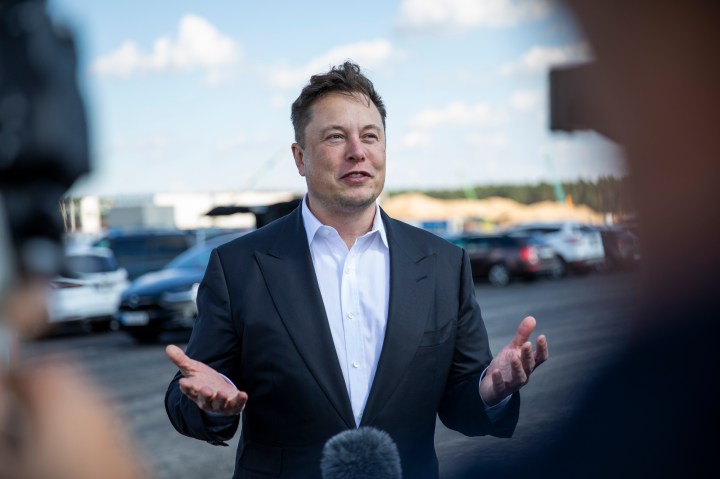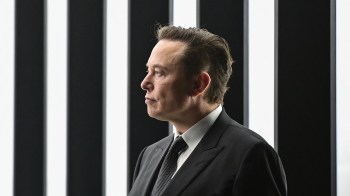
Elon Musk is buying Twitter for $44 billion. Is it just about free speech?
Elon Musk is buying Twitter for $44 billion. Is it just about free speech?

Twitter announced Monday it is being acquired by Elon Musk in a $44 billion deal, at a per-share price of $54.20. The agreement comes 11 days after Musk, the CEO of both Tesla and SpaceX, initially offered to purchase Twitter, prompting the social media company to adopt a “poison pill” strategy to fend off a takeover.
“Marketplace” host Kai Ryssdal spoke with Lauren Hirsch, a business reporter at The New York Times, about the deal. The following is an edited transcript of their conversation.
Kai Ryssdal: Setting aside all marijuana jokes that many people made with this price that Musk offered, clearly he was serious. And now this has happened in an unbelievably fast timeline, right?
Lauren Hirsch: Unbelievably fast. I’ll tell you, I was at a show yesterday communicating with the source kind of casually, checking in, and my source goes, “I think there could be a deal tomorrow,” and I go, “What? How is that even possible?” You know, I think most people never thought a deal would have happened, and even if people thought there were to be a deal, I don’t think anyone thought it could have possibly happened this quickly.
Ryssdal: He gets all the money together, they have these board meetings over the weekend, and then today it’s a done deal. Let me ask you this, though. And this may be a longer answer than we have time for in the program today. Why does Elon Musk wanna buy Twitter?
Hirsch: I can tell you what he has said, which is he would call himself an advocate for free speech, and he doesn’t like the way that Twitter has managed content on its platform. And he wants to change that. He spoke in a statement today about kind of decentralizing its content, so effectively allowing users to personalize the content that they see on the app. But I’ll tell you, a lot of people really don’t know. You know, that is what he said, but it feels like there might be something deeper here to spend $40 billion, largely of his own money,
Ryssdal: Right. I noticed you didn’t say he wants to make money, he wants to run it as a better business. And so the logical extension of that is here you have an American oligarch buying a global communications platform, and we’re just gonna have to see what happens?
Hirsch: We’re just gonna have to see what happens. I don’t think we have really ever seen anything like this. You know, obviously, Jeff Bezos bought The Washington Post. But that was very different. He said he would not get involved at all editorially. And Elon Musk has cited editorial concerns as his desire in buying it. So no, we don’t really know what the end goal is here. And he said on his TED talk the day, you know, around the time that he announced his bid, that profit is not a motive. So it’ll be interesting to see how this turns out.
Ryssdal: It will indeed. To the, to the nuts and bolts of this negotiation, he comes in and says, “I want to buy Twitter, and here’s my price. Final offer.” The board says, “Eh, I don’t know.” There’s talk about a poison pill, the board’s clearly not excited. And then, presto change-o, the board says yes. Did they just give up and say, “You know what? We don’t have a better way to run this thing. You do it.”?
Hirsch: The big presto change-o was him putting together financing. Many people thought he would never be able to do it. But on Thursday, he made public that he had actually pulled together, I think more than the actual offer ended up being. So that changed the game for the board. All of the sudden they had to take the offer seriously, and the pressure was mounting, shareholders were calling. And at a certain point, you have to listen to your shareholders, and they seemed to be indicating they wanted to go with Elon’s deal.
Ryssdal: So, last thing, and then I’ll let you go because I know you’ve got reporting to do on this. You’re on Twitter. I’m on Twitter. Lots of people we both know are on Twitter, journalists and many others. But the overwhelming majority of the American public isn’t. Why do we care about this?
Hirsch: That’s an excellent question. I think it goes to what we were discussing earlier. You know, the power of wealth certainly in our country to effectively get pretty much anything you want. I don’t think anyone thought that Twitter was in sights, but the fact that he’s the richest person in the world makes it so. You know, as a journalist, you kind of have this very idealistic view of communications and media and how it should be run. And this really has taken the rug out from under that because this is a man with a clear view. And he’s going to run it with that clear view. And I think we all need to rethink the ramifications on communication in the country.
There’s a lot happening in the world. Through it all, Marketplace is here for you.
You rely on Marketplace to break down the world’s events and tell you how it affects you in a fact-based, approachable way. We rely on your financial support to keep making that possible.
Your donation today powers the independent journalism that you rely on. For just $5/month, you can help sustain Marketplace so we can keep reporting on the things that matter to you.

















